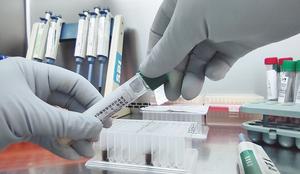 A medical worker opens a nucleic acid test sample at Wuhan No 4 Hospital. (WANG JING / CHINA DAILY)
A medical worker opens a nucleic acid test sample at Wuhan No 4 Hospital. (WANG JING / CHINA DAILY)
As an increasing number of people go back to work and coronavirus prevention is becoming normalized in China, the need is growing for nucleic acid testing, which is required by local authorities and employers.
According to a regulation announced by Beijing's health commission on Sunday, people who come or return to Beijing must provide negative nucleic acid testing results.
According to a survey conducted by China Daily on its Weibo account, 45 percent of about 8,000 people would like to take the nucleic acid tests at their own expense
Government workers who have been out of Beijing for work should take the test when they return.
Patients at fever clinics and inpatients who have respiratory symptoms also should be given the nucleic acid test.
READ MORE: Testing intensifies as clusters of infections increase
According to a survey conducted by China Daily on its Weibo account, 45 percent of about 8,000 people would like to take the nucleic acid tests at their own expense.
Many respondents posted that if they feel uncomfortable, they will do the test, while many others said they would choose not to do it for fear of cross-infection at facilities or not wanting to pay for it themselves.
Many people don't think the test is necessary, saying they will only do it if required.
On Wednesday, Beijing released the names of the first batch of 46 institutions that can provide nucleic acid testing for individuals and groups.
Among the 46 institutions, 28 offer testing services for individuals and groups, while the rest provide such services only for groups, Gao Xiaojun, spokesman for the Beijing Municipal Health Commission, said on Wednesday.
Several later additions have brought the number of institutions to 50.
According to CapitalBio Med-Lab, one of the 28 institutions, the testing fee for each person is 300 yuan (US$42), including sampling.
According to CapitalBio Med-Lab, one of the 28 institutions, the testing fee for each person is 300 yuan (US$42), including sampling
On the day after the announcement, long lines formed at many hospitals on the list, according to Beijing Daily.
A woman surnamed Liu from Xiaogan city in Hubei province, came to take the test as required by the company she works for in order to resume working.
In order to stay at a hotel, a middle-aged man who went to Beijing for a short business trip came to take the test right after he arrived in the capital by train.
ALSO READ: Wuhan conducts nucleic acid tests for all backlog of patients
A female student in her final year of senior high from Langfang city in Beijing's neighboring Hebei province, came to take the test to resume school.
Li Dong, a doctor at Beijing You-An Hospital, said it takes one to two minutes to take a sample, and the result can be checked through a health app within 24 hours.
"If a person doesn't have symptoms such as fever, we suggest that it's not necessary to take the test," Duan Yufei, director of Guangdong Provincial Health Commission, was quoted by CCTV news.
Fu Tiehong, an official at Zhejiang Provincial Health Commission, said that if someone gets sick, he or she should go to the hospital and follow the guidance given by the doctor.
In addition to Beijing, many other municipalities and provinces including Shenzhen, Zhejiang, Guangxi and Shandong have identified the official institutions that can provide nucleic acid tests.
According to Shenzhen University General Hospital, about 5,000 people have made appointments for the tests, accounting for 65 percent of the total samples the hospital has collected since March 3.
Most people are required to take the tests and just a few took the test on their own accord, according to the hospital.
Pei Pei contributed to this story.


